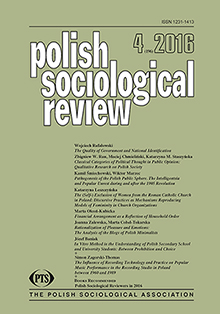The (Self-) Exclusion of Women from the Roman Catholic Church in Poland
The (Self-) Exclusion of Women from the Roman Catholic Church in Poland
Discursive Practices as Mechanisms Reproducing Models of Feminity in Church Organizations
Author(s): Katarzyna LeszczyńskaSubject(s): Christian Theology and Religion, Social Sciences, Gender Studies, Sociology, Theology and Religion
Published by: Polskie Towarzystwo Socjologiczne
Keywords: gender; dicursive practices; Roman Catholic Church; social institution; agency
Summary/Abstract: In this article I analyze discursive practices that serve to reproduce models of femininity and that are adopted by lay women employed in central Church organizations, including in diocesan chanceries and ecclesiastical courts. The key discursive practice is dissociation, which excludes women from various institutional orders of the Roman Catholic Church in Poland, keeping them in their place in the hierarchy, and sanctioning non-normative gender models.Drawing on integration theories of gender and new institutionalism in sociology, I depart in this article from individualist and identity views of gender. I consider this category as a social institution, that is, as the social rules, both formal and informal, that restrict and liberate human action and are reproduced and transformed in social practices as a result of human agency.My article is based on 31 in-depth interviews which I conducted with lay women working in administrative and evangelizing organizations of the Church in Poland.
Journal: Polish Sociological Review
- Issue Year: 196/2016
- Issue No: 4
- Page Range: 459-476
- Page Count: 18
- Language: English

